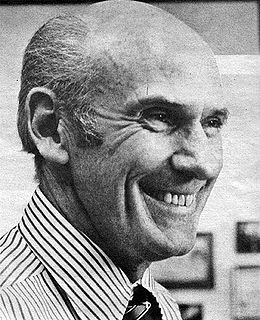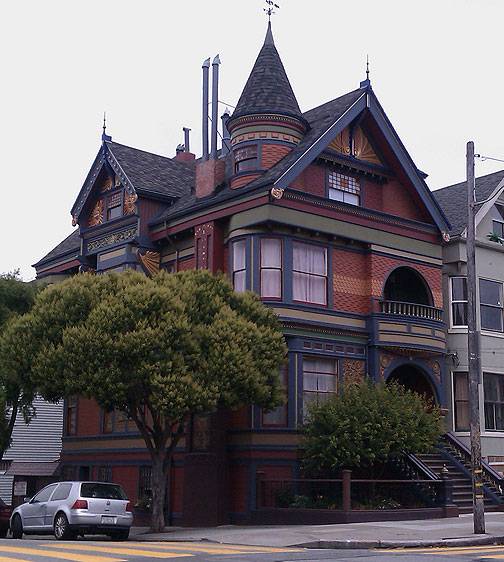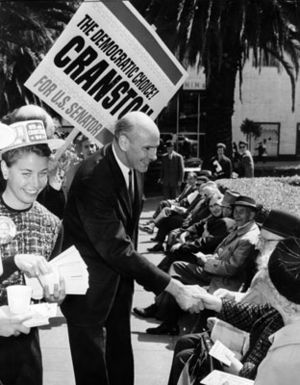Senator Alan Cranston: Hawkish Dove
Historical Essay
Originally published in It's About Times, the Abalone Alliance newspaper, Oct-Nov. 1983
| Senator Alan Cranston claimed an allegiance with the Nuclear Freeze movement in the midst of the Cold War, but his sincerity remained dubious. Contrary to Freezers’ wills Senator Cranston had continually voted to develop nuclear weaponry like the B-1 strategic bomber. In response to such criticism, Senator Cranston argued that some development is needed as a temporary solution to assist in the policy of deterrence. However, his contemporary critics pointed to inconsistencies in his arguments and instead argued Cranston was only giving lip service for votes. His critics claimed he actually promoted the research of nuclear technology so that he could help enrich corporations like Lockheed Aircraft that benefited from his policies. |
"If the consequences of nuclear war are total—and they are—then our commitment to preventing it must be total as well." —Alan Cranston, in a campaign letter to California liberals
"I support the theory of deterrence, even though it would not work forever." —Cranston, in an interview with Rolling Stone
Ever since Kennedy pulled out of the 1984 presidential contest, Senator Alan Cranston (D-Ca) has promoted himself as the Great Liberal Hero and heir apparent to the 11 million-vote wealth of the Nuclear Freeze.
Cranston's campaign has been built around' his jumping on the Freeze bandwagon, and in timehonored fashion, some Freezers have returned the favor. This is particularly odious and myopic because on four separate occasions since 1975 Cranston has voted for the B-1 strategic bomber. The last time was this summer, shortly after he "championed" the Freeze cause in the Senate.
Cranston has also voted against deleting funds for development and production of the F-18 fighter plane (1978) and for continued development of the MX (1981).
In 1978 Cranston led the fight to abolish the federal Renegotiation' Board, an agency whose function was to scrutinize Pentagon procurement contracts for excessive profiteering.
In 1972, Lockheed Aircraft, the third largest military contractor in the country, was in serious financial trouble and facing bankruptcy. Cranston came to the rescue again, ushering a $250 million bail-out bill through the Senate.
Cranston's attempts to justify his support for the B-1 bomber are a remarkable example of convoluted reasoning --so convoluted, in fact, that even the national press corps, which has been known to accept some truly astounding excuses from major politicians, seems to find it hard to swallow.
This home at the corner of Ashbury and Page Streets in the Haight-Ashbury district is the place where future Senator Alan Cranston grew up. Curiously, the basement, accessible through a door at 460 Ashbury on lower left of this image, was also the 2nd office of the 1980s underground magazine Processed World.
Here's the essence of the rap, in its latest version: Nuclear war is unthinkable, and would be the end of the human race. The Republicans have brought us perilously close to the unthinkable, and we get closer every day. Above all,' that danger comes from "the failure of our leaders" who have "ignored the cries of the people."
Now watch closely: As long as we don't have those leaders, Cranston contends, we have no choice but to endorse "deterrence." Deterrence, of course, requires state-of-the-art equipment. The old B-52 bomber fleet is "becoming antiquated," so we have to replace it. And the B-1 seems to be the plane for the job.
Since his first major defeat—in a 1964 race for the Democratic nomination for the Senate—Cranston has worked hard never to alienate a major block of potential supporters. He has earned a widespread reputation as the Great Compromiser, a liberal who can sit down and Talk Turkey. If there is one thing Alan Cranston is not, it's a Crusader.
Yet some of the rhetoric he has been spouting to show his die-hard support for the Freeze is nothing short of Quixotic. "Our generation has a duel with destiny;" a recent campaign flyer proclaims. "The finish line is not Election Day, 1984," it goes on to say. "That will be only the starting line of the campaign that really counts—to heal our own nation and to bring ourselves and our children out from under the dark shadow of nuclear war." Our aim, he says, "must be the total abolition of nuclear weapons."
Heady stuff.. and, even among the high-flying bullshit of presidential propaganda, a bit remarkable for a man who has built an entire career around keeping the support of his home state's biggest Pentagon contractors—people who would be put right out of business by "the total abolition of nuclear weapons."
Which is exactly the point. Cranston knows damn well he can't afford to drop such powerful backers like so many lead balloons. But he also knows they don’t give a snaildarter’s ass WHAT he says in public about the arms race. They care about how he votes, and what he does for them behind Capitol Hill doors.
Originally published in the letters section of “It’s About Times,” the Abalone Alliance newspaper, February-March 1984.
Editor's note: The following letter was sent to us by Fred Dickson, an IAT reader who has contributed to Alan Cranston's campaign for president. After reading an IAT piece on the California senator, (Oct-Nov. 1983, and above) Dickson sent Cranston a letter challenging him on some of the points raised in the article. In the interest of continuing and broadening this debate, we have printed the letter Cranston wrote in reply, and a response to Cranston by the authors of the original IAT article.
Dear Fred,
I greatly sympathize with your concerns about the article to which you referred. Let me assure you that your contribution to my campaign was no mistake.
As you may have surmised, the article represents a very slanted point of view. The bias is evident right from the beginning, when the anonymous writer refers to my "jumping on the Freeze bandwagon." I first became aware of the nuclear danger when I met with numerous scientists and experts, including Albert Einstein, at Dublin in 1945. Besides have been an original co-sponsor of the Kennedy-Hatfield freeze resolution, I have been a consistent, forthright advocate in the Senate for the need to achieve a freeze as a crucial first step towards the reduction of nuclear stockpiles; Among the Democratic Presidential candidates, I was the first to support the freeze openly, in January, 1982.
I appreciate your concern over my support for the B-1. I must point out that a freeze would stop production of the B-1. We would be fooling ourselves, moreover, if we did not acknowledge the necessity of maintaining an effective deterrent until we set a freeze.
Our deterrent is based on the nuclear triad of air-, sea-, and land-based missiles. Bombers are the best of the lot from an arms-control standpoint. They are slow, and thus not first-strike weapons. They are easily monitored and can be recalled if they are sent out in error or if the situation changes, unlike unmanned missiles, which cannot, be recalled.
Deterrence does not require "state-of-the-art" equipment. I have outspokenly opposed the reckless Reagan defense budget proposals, including the MX, neutron bomb, binary chemical weapons, nuclear carriers, and the reactivation of old WW II battleships.
My vote on the MX (which, by the way, came in 1979, not 1981) was not to continue development, but to continue research on the possibility of developing the MX. This position was supported by a large majority of the Senate. This vote took place before the MX was to be based on the race-track system, and before the Congress closely examined its strategic and practical problems.
Upon such an examination, I concluded that the MX would not add to our security, but would instead make a tempting first-strike target for Soviet missiles. In the long run, as the Soviets would of course develop similar technology, it would serve to escalate the incredibly dangerous, expensive arms race. I thus spoke out strongly against it, and have voted on every occasion to kill it since then.
While the author mentions the functions of the Federal Renegotiation Board, he does not mention the fact that it was largely ineffective in performing those functions. The Board spent more money than it was getting back from defense contractors, and had no control over cost overruns -- the major problem in defense contracting. Because the need to monitor closely the procurement procedures of the Defense Department remains real, I co-sponsored legislation designed to replace the outdated and no-longer-useful Board. This legislation created an Inspector General at DoD, largely responsible for finding account overcharges.
Additional legislation would set up an independent office in the Pentagon to evaluate and test weapons systems. This differs from the IG in that the purpose is to eliminate the problems of cost overruns in new weapons systems, and to make sure that the new equipment works. This office would make a recommendation on the cancellation of a program that far exceeds its original costs, as was the case with the Bradley Infantry Fighting Vehicle.
Regarding Lockheed, the recent government bailout of Chrysler shows that the government often times must step in to help industry and save thousands of workers from the despair of unemployment. Lockheed not only is a defense contractor, but is also a major producer of commercial aviation equipment and other lay technologies.
Finally, Fred, I'd like to know the source of this article so that I can publicly respond to these unfair attacks. I hope that this letter reassures you that I am still worthy of your support. I welcome your comments, and greatly appreciate all that you have done for my campaign.
—Alan Cranston
Tim Redmond and Steve Stallone respond:
Cranston's letter raises some important questions and allows us to address some issues not fully discussed in the original piece.
The article was a collective effort by Tim and Steve. Under the pressure of looming deadlines, it was edited to the satisfaction of neither of us and so ran without a byline -- admittedly a mistake for so controversial an issue. Nonetheless, we still stand behind the main point of the article -- that Cranston's support of the B-1 bomber and other weapons systems while mouthing support of the Freeze' makes him just another double-talking liberal politician out to use the disarmament movement for his own purposes.
To understand our criticisms of Cranston, it's important first to understand the nature of a modern political campaign. In our media-based society, a presidential campaign is almost entirely a public relations effort -- a sales job. Almost all big-time campaigns in America are run essentially the same way sales and marketing campaigns are run. First, you identify a potential market for your product. You survey that market, and determine the prevailing attitudes. Then you design an advertising strategy to emphasize the positive attitudes towards your product, and play down (or at least confuse) any negative feelings your product may elicit. In other words, you find out what the public can be made to buy. Then you create that image for your product and sell it to them.
So when we say Cranston "jumped on the freeze bandwagon," we are not saying he suddenly decided to announce his opposition to nuclear war. We are saying that, during the early stages of his campaign strategy formation, Cranston's political advisors identified the 11 million Americans who voted for the nuclear freeze in 1982 as a major potential market for his presidential bid. As a long-shot contender, Cranston's only hope was n and is n to attract a major bloc of voters already organized around a specific issue or concern. And since organized labor already appeared committed to Walter Mondale, and the possibility of a black candidate was looming, Cranston geared his campaign toward the constituency most likely to throw its considerable weight behind him—the freeze movement.
So if his literature and recent public statements seem to portray him as a man driven by a lofty quest to save humanity at all costs, bear in mind that you are seeing a carefully crafted image — one Cranston must sell to the freeze movement and peace sympathizers if he is to have the slightest chance of winning the nomination.
Cranston's letter is an excellent example of how facts can be stretched and the inconsistencies obfuscated in the interest of a political point. Take a close look at how he defends his support for the B-1 bomber and his past vote in favor of the MX.
Although the freeze he claims to support would stop B-1 production, he says "We would be fooling ourselves" not to acknowledge the "necessity" of maintaining an "effective deterrent." Presumably, the B-1 is part of that "necessary, effective deterrent."
But Cranston doesn't say that, not in so many words. Instead, he says that "bombers" are the best of the deterrence triad because they are slow, and, unlike missiles, can be called back. He goes on to say that "Deterrence does not require 'state of the art' equipment." (Notice that among the "state of the art" hardware he says he has opposed is "the reactivation of old WWII battleships.")
Then Cranston waves his hands and moves on to the MX—without ever having told us why he supports a new, expensive bomber that his favorite cause would involve scrapping. If deterrence doesn't require "state-of-the-art" equipment, and the advantage of bombers is that they are slow why spend biIlions more on the B-1 when the present B-52s are older and slower?
Cranston's vote on the MX, he says, was "not to continue development, but to continue research on the possibility of developing the MX, This position was supported by a large majority of the Senate.
Justifying support of this expensive boondoggle just because the proposal was backed by a large majority of the Senate is a silly excuse that wouldn't get past a kindergarten teacher.
His 1979 vote may have taken place before Congress had figured out that the missile was a ridiculous waste of money—so far as we can tell, Congress still hasn't figured that out. But the MX was not a stupid idea simply because it would cost tens of billions of dollars to destroy the entire ecosystem of the Nevada/Utah desert. Its pinpoint accuracy and multiple independently targeted warheads made the MX missile a provocative, destabilizing first strike weapon. How much more research does one who claims to oppose the escalating arms race need? And this man wants us to make him president?
As for the Federal Renegotiation Board, Cranston may be happy that the Defense Department has taken over responsibility for monitoring its own budget, but it leaves us a bit nervous. And, we suspect, it has made certain generals and corporate presidents much happier.
If the freeze movement wants to become an effective political force, freeze backers—and disarmament advocates in general—need to start facing up to political reality, If they need any insights, they need look no further than the recent Congressional action on the Freeze resolution. The House of Representatives, with much hoopla, passed a freeze bill last year so watered down that it would have absolutely zero effect on American military policy and then turned right around and voted to fund the MX missile.
Congress voted for the freeze purely for political reasons n so they could tell people they'd voted for it. Cranston knows very well that a real nuclear weapons freeze would have a massive impact on America's economy.
The Investor Responsibility Research Center, a Washington DC based group that researches major corporations for "socially responsible" investors, released a report in January that lays out the amount of money 19 leading defense contractors would have lost if a nuclear freeze had been in effect in 198 I. The numbers are quite revealing: Martin Marietta, the most "freeze-impacted” firm, would have dropped 39% of its $546 million in DoD contracts if the freeze had been in effect that year. Rockwell International would have lost 23% of its contracts, Lockheed, 32%.
Alan Cranston's home state has the second most defense-dependent economy in the nation, after Connecticut. The effect of a freeze on California, as well as on the rest of the nation, would be staggering.
Cranston knows that a nuclear weapons freeze is feasible only if it is coupled with some serious changes in the economy—changes that would have some nasty implications for the future of our present power structure. Let's face it n conversion of the military industrial complex would mean some changes in who makes decisions about what and why. And the ruling class is not about to relinquish its prerogative over these matters just because it has been outvoted.
If we allow our energies to be diverted into the campaigns of duplicitous politicians, we deserve what we’ll get stabbed in the back. If we must vote to defend past gains or to gain "social space" to continue our struggles, let's do so without illusions.



